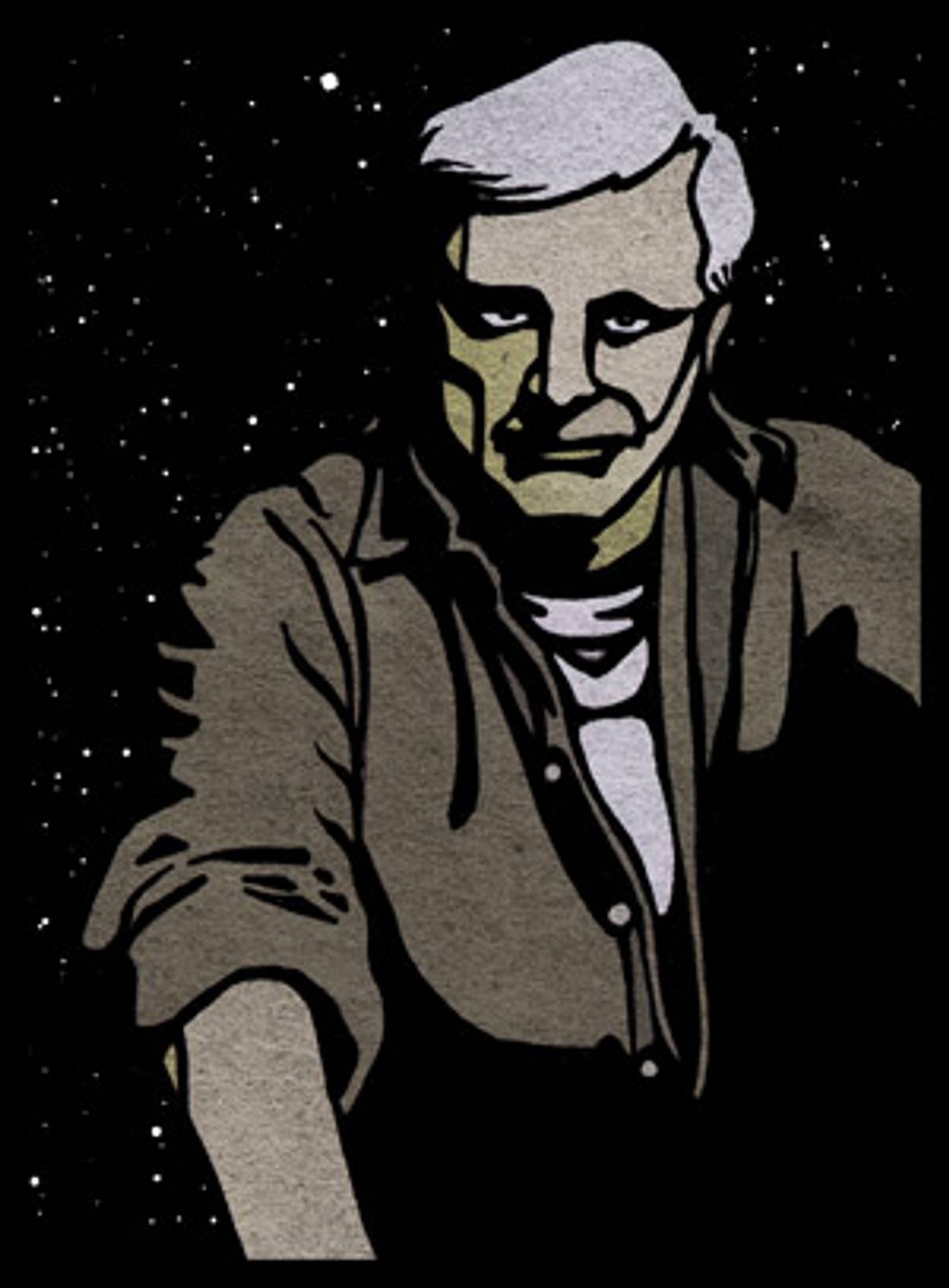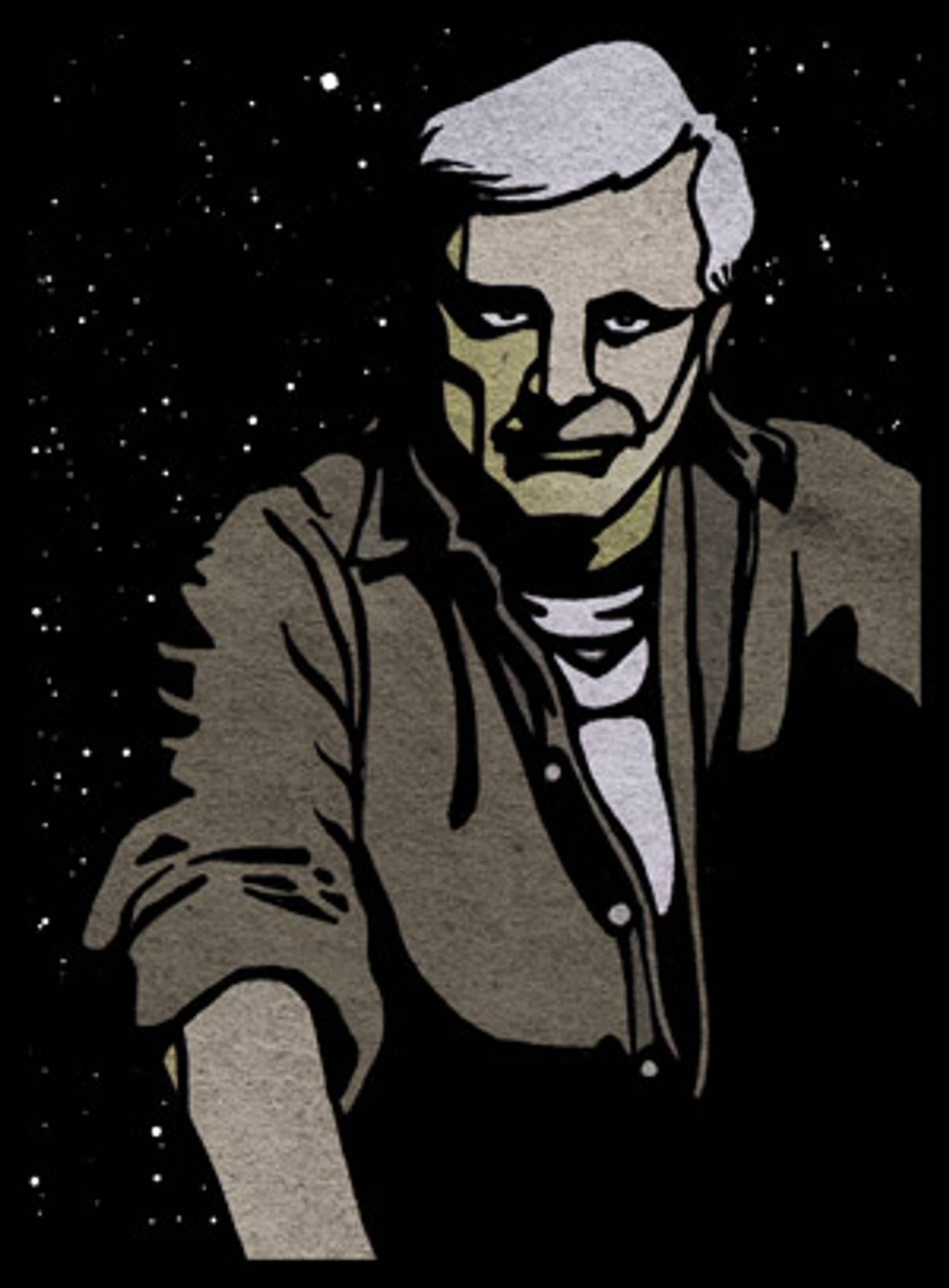The Irritable Man
Why Harlan Ellison’s personality overshadows his classic science fiction




Toward the end of Dreams with Sharp Teeth, a new documentary about the science fiction writer Harlan Ellison, his friend and fellow fantasist Neil Gaiman attempts to sum up Ellison, who has, over the course of his seventy-four years, written millions of words, won dozens of awards for his short stories and teleplays, married five times, had sex with “over seven hundred women” (or so Ellison says), marched with Martin Luther King in Selma, and traveled with the Rolling Stones.
“You have to accept that you have somebody who is partly one of the greatest writers of the twentieth century . . . and, at the same time, a cranky old Jew,” says Gaiman, who’s also a Jew, though a very genial one. “. . . Like some people live in castles, he lives in cranky old Jew world.”
It’s a nice denouement to the film, which is both a hagiography of Ellison—a talented writer, but not one for the ages—and a character study of a certain kind of Jewish boy, belonging to a certain generation, whose life has been a running battle between his talents and his demons.
In the 1960s and ’70s, Ellison became known to the world (or at least to a certain geeky segment of it) as a writer of short science fiction and as a kind of science fictional version of Norman Mailer—a pugilistic, charismatic literary personality whose own exploits were often as much a part of the story as his stories. He published well-regarded collections like Ellison Wonderland, Love Ain’t Nothing But Sex Misspelled, and Deathbird Stories. He wrote the teleplay for the classic Star Trek episode “City on the Edge of Forever.” And he made a scene, and often a fool of himself, at every opportunity.
The Ellison story begins more quietly, however. He was born in Cleveland, in 1934, and soon moved with his family to the small town of Painesville, Ohio. The miseries he endured there were both communal and familial.
Painesville, writes Ellison in his memoiristic essay “Everything I Know About My Father,” was “famed for its anti-Semitism.” In addition to the typical indignities he suffered for being one of the few Jews in town, Ellison got bonus lessons. One summer, while he was away at camp and while his parents were in Cleveland for the day, a neighbor called the pound on his dog, who was taken away and gassed.
“I hate her as much today, forty years after the fact, as I did the day I came back from camp and my father took me in his arms and explained that Puddles was dead,” writes Ellison in the introduction to his revenge fantasy “In the Fourth Year of the War.” “The old woman is no doubt long gone, but the hate lives on.” (Ellison’s grudges are lifelong, and he seems to savor them.)
He was regularly roughed up at school (for being Jewish, scrawny, and a smartass), and was once beaten so badly he lost consciousness. That beating became a kind a primal scene for Ellison, one he would later describe, in various ways, in stories, essays, and interviews. In the story “Final Schtick,” for instance, he writes:
At recess time they get you out on the ball diamond, and one of them picks a fight with you. Usually it’s Jack Wheeldon, whose head is square and whose hair is cut in a butch, and whose father is a something or other at the Diamond alkali plant. . . . You stand there while Jack Wheeldon calls you a dirty kike, and your mother is a dirty kike and you pee your pants because all kikes do that, don’t they, you frigging little kike? And when you swing, and hit him on the side of the head, the circle of kids magically grows about you, and while you’re locked in an adolescent grapple with Jack Wheeldon (who is all the things in this life that you despise because they are bigger than you and slower-witted and frightening), someone kicks you from behind. Hard. At the base of your spine. With a Thom McAn shoe. And then you can’t help it and you start to cry.
His home wasn’t much of a refuge. His parents, Louis and Serita, were decent but unhappy people. In “The Death of My Mother, Serita R. Ellison,” which ran in Ellison’s column for the St. Louis Literary Supplement, Ellison writes of her family, the Rosenthals, that they had “a capacity for unhappiness that was awesome to behold, and Mom was a Rosenthal to her shoetops.”
Louis “Doc” Ellison had been a dentist before hard times, and apparently some shenanigans, forced him to close his practice. For a while, he smuggled bootleg liquor down from Canada, and then, after a stint in jail, managed the jewelry store of his brothers-in-law. After many years building up the business of the store, which he’d been led to believe he was also building a stake in, the Rosenthal boys cut him loose. “[W]hen the crunch came down, my old man was out on his ass,” writes Ellison in “Everything I Know About My Father,” “But it had been my mother’s brothers, you see, and so there wasn’t much he could do about it. Jewish families hang tight that way. So at close to the age of fifty, my father had to open his own store.”
Louis died not long after of a massive heart attack, which Harlan, then fifteen, happened to be in the room to witness. Even before his father’s death, Ellison had been bent on getting the hell out of Painesville. At thirteen, he ran away for three months with a touring circus, returning home only after he was tracked down by a private detective hired by his parents.
After his father’s death, the family re-located to Cleveland. It was there that Ellison found both his community—science fiction fandom, with its clubs and conventions and fan zines—and a vessel, in the genre of science fiction, for his fantasies of escape, fame, wealth, and payback. After high school and an interlude at Ohio State (which ended when he told a creative writing professor to go fuck himself), Ellison moved to New York. He threw himself into the science fiction community there, selling his first story toward the end of 1955 and firming up his friendships with other young science fiction writers, like Robert Silverberg, whom he’d known until then through correspondence and meetings at the occasional science fiction convention.
The New York science fiction scene, in the 1950s and ’60s, was a heavily Jewish milieu. In part it was just New York, where anything literary had a Jewish vibe. In part it was that many of the pioneering editors and publishers of science fiction—men like Hugo Gernsback, whose magazine Amazing Stories launched the genre—happened to be Jewish. And it was because science fiction, from the moment it coalesced as a subculture in the 1920s, had proven irresistible to nerdy Jewish kids who dreamt of worlds in which intellect was the pathway to power and glory (as well as acrobatic, zero-gravity sex with women of futuristic morals).
All this Jewishness, however, tended to disguise itself, or disappear entirely, by the time it got to the page. “I didn’t write on Jewish themes,” writes Isaac Asimov, in his introduction to 1974’s Wandering Stars: An Anthology of Jewish Fantasy & Science Fiction. “I didn’t think of Jews, particularly, in connection with robots, wrecked spaceships, strange worlds with six suns, and Galactic empires. The subject didn’t come up in my mind.”
Daniel Oppenheimer is the author ofExit Right: The People Who Left the Left and Reshaped the American Century. He is working on a book about critic and writer Dave Hickey.